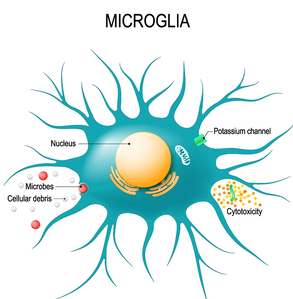|
Neuroinflammation is a hallmark of degenerative brain diseases like Alzheimer's Disease (AD), so understanding the causes and mechanisms are critical for most appropriately treating our patients. Now, we’re learning that autism, which I believe to be the earliest form of neurodegenerative disease, is also autoimmune in origin. It seems reasonable then to raise a big red flag as far as our efforts to better understand these processes and address the dramatic increase in the incidence of autism and other neurological conditions.
Microglia, immune cells in the brain, are an important part of the body's immune system and its inflammatory response. Scientists are beginning to understand how microglia respond to infectious and environmental triggers and learn how this response can become disordered and/or harmful to the brain. It may be microglia in part that account for autism rates we’ve seen skyrocket in the last 30 years, with an estimated one in 40 children on the spectrum now vs. just one in 10,000 in the early 1970s. Unbelievably perhaps, we are on pace to have one in two children develop these neurological issues in the not-too-distant future – unless we can determine a way to arrest and reverse this trend. Dr. Richard Frye and colleagues have worked in this field for several decades. His recent study using intravenous immune globulin (IVIG) in autism is profoundly important to further prove the immune-mediated theories of autism prevalence and to offer hope to these children and their families. The study published in Translational Psychiatry showed remarkable benefits in patients with autism using high dose IVIG 2 grams / kg q month. Patients with autism spectrum disorder (ASD) were screened using various measures as well as the Cunningham panel. There are specific associated neuronal antibodies that have been attributed to ASD and the overlap of the autoimmune-mediated PANS and PANDAS disorders as well. Study results found 90% of the patients exhibited some improvement and 71% showed significant improvement. It’s important to note that Dr. Frye found that you cannot lower the dose of IVIG employed in the study as often these patients’ conditions will worsen. He also believes because mitochondrial dysfunction is part of the pathology in this brain disease that IVIG works best with mitochondrial support. Given that folate metabolism in autism is impaired that many patients do best with folinic acid supplementation. Dr. Frye and colleagues found that children in the study who received folinic acid demonstrated significantly greater improvement in verbal communication and other behaviors such as daily living skills, irritability levels, stereotyped behavior and hyperactivity compared to the children receiving the placebo. (2 mg/ kg / day) With all this discovery taking place in the field and the concerns of so many professionals and parents alike regarding autism I will definitely be writing more on this topic in the coming weeks. It’s just part of a conversation we all need to have and one that we will be addressing as part of our care plans in our integrative neurology practice. As always, we remain committed to the goal that together we can find more solutions for our young patients and help families thrive together. In health, Dr. Suzy Gazda
0 Comments
Your comment will be posted after it is approved.
Leave a Reply. |
AuthorDr. Suzanne Gazda, Integrative Neurology Archives
February 2024
Categories |


 RSS Feed
RSS Feed